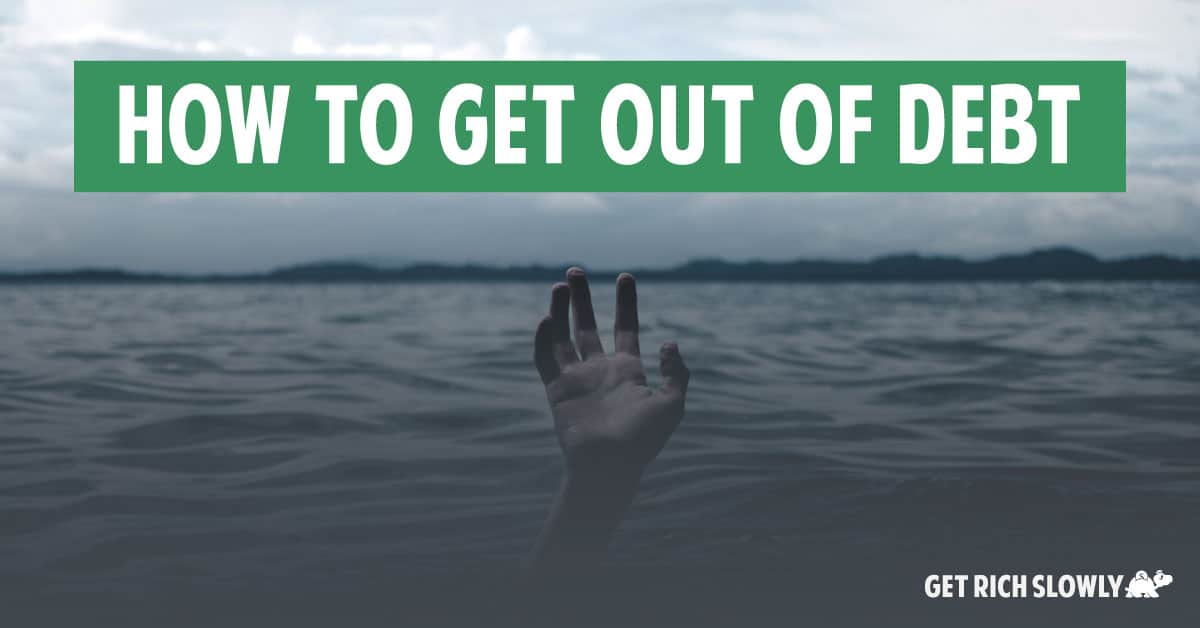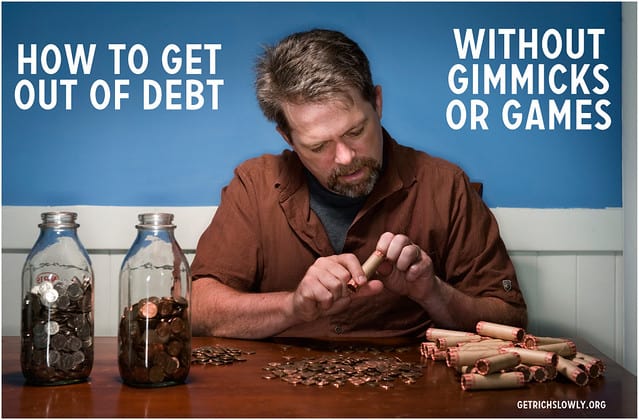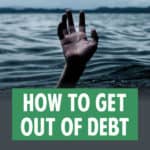How to get out of debt (without gimmicks or games)

As part of back to basics month, let’s use today to explore how you can get out of debt without gimmicks or games.
After twelve years of reading and writing about money, I’ve come to believe that debt reduction ought to be a side effect and not a goal. Getting out of debt is a target, not a habit. And, as we’ve been discussing recently, good goals are built around actions instead of numbers. If you restructure your life so that you’re spending less than you earn, you will get out of debt. It’s a natural side effect.
Having said that, I realize that a lot of GRS readers are struggling to get to square one. Getting out of debt is their goal and primary obsession. That’s okay.
Before you can begin repaying your debt, you must be earning a profit. Unless your income exceeds your expenses, your debt is actually increasing. If you’re continuing to add debt, or if you’re only able to make minimum payments, you must first find ways to spend less and earn more until you have a positive “saving rate”. (Both businesses and people earn profits. But when individuals earn a personal profit, we call it “savings”.)
After you’re earning a personal profit, you can (and should) make debt elimination a priority.
Why You Should Pay Off Your Debt
Debt repayment can improve your credit score, meaning you’ll pay less on everything from rent to car insurance to future borrowing needs. Plus, debt reduction is one of the best returns you can earn on your money.
Investing in the stock market provides an average annual return of about 10% — but that return isn’t guaranteed. Some years the market is up 30%, but other years it drops by 40%. When you pay down a credit card, you earn a guaranteed return of 20% (or whatever your interest rate is). That’s tough to beat.
There are also non-financial benefits to paying off debt, including:
- Simplicity. The more debt you have, the more bills you have. It’s easier to manage your money when you have a simple, efficient financial infrastructure. Each time you pay off a debt, you move one step closer to this ideal.
- Cash flow. Whenever you eliminate a debt, the money formerly used for that monthly payment becomes available to pursue other goals – including fun stuff like ski trips and knitting supplies.
- Freedom. When you have monthly payments to meet, you’re chained to your job. You’re unable to take risks. Once your debt is gone, a wider range of options becomes available to you.
- Peace of mind. Best of all, once you’re debt-free, you can sleep easier at night. You’ll put less pressure on yourself, and you’ll have fewer fights about money with your partner.
When I first tried to get out of debt, I lacked a system. Without a plan, I sent extra money to one credit card and then another. As a result, I never seemed to make any progress.
After deciding to become boss of my own life, however, I researched how to get out of debt. Many books recommended a strategy called the “debt snowball”. Although I was skeptical, I gave it a try. The method worked. Using it, I managed to eliminate my debt and begin saving for the future.
Stop Acquiring New Debt
This may seem self-evident, but the reason your debt is out of control is that you keep adding to it. Stop using credit. Don’t finance anything. Cut up your credit cards.
That last one can be tough. Don’t make excuses. I don’t care that other personal finance sites say that you shouldn’t cut them up. Destroy them. Stop rationalizing that you need them.
- You don’t need credit cards for a safety net.
- You don’t need credit cards for convenience.
- You don’t need credit cards for cash-back bonuses.
You don’t need credit cards at all. If you’re in debt, credit cards are a trap. They only put you deeper in debt. Later, when your debts are gone and your finances are under control, maybe then you can get a credit card. (I don’t carry a personal credit card. I don’t miss having one.)
After you destroy your cards, halt any recurring payments. If you have a gym membership, cancel it. If you automatically renew your World of Warcraft account, cancel it. Cancel anything that automatically charges your credit card. Stop using credit.
Once you’ve done this, call each credit card company in turn. Do not cancel your credit cards (except for those with a zero balance). Instead, ask for a better deal. Find a low interest credit offer online and use it as a bargaining wedge. Your bank may not agree to match competing offers, but it probably will. It never hurts to ask.
Establish an Emergency Fund
For some, this is counter-intuitive. Why save for an emergency fund before paying off debt? Because if you don’t save first, you’re not going to be able to cope with unexpected expenses. Do not tell yourself that you can keep a credit card for emergencies. Destroy your credit cards; save cash for emergencies.
How much should you save? Ideally, you’d save $1,000 to start. (College students may be able to get by with $500.) This money is for emergencies only. It is not for beer. It is not for shoes. It is not for a Playstation 3. It is to be used when your car dies, or when you break your arm in a touch football game.
Keep this money liquid, but not immediately accessible. Don’t tie your emergency fund to a debit card. Don’t sabotage your efforts by making it easy to spend the money on non-essentials. Consider opening an online savings account. When an emergency arises, you can easily transfer the money to your regular checking account. It’ll be there when you need it, but you won’t be able to spend it spontaneously.

The Debt Snowball
With the debt snowball, you set aside a specific amount of cash each month to pay off the money you owe. At first, progress is slow. In time, however, you begin to make rapid progress, picking up speed like a snowball rolling downhill.
Step One
The first step is to make a list of your debts. For each obligation, include the balance you owe, the interest rate, and the minimum payment. Arrange the list so that the debt with the highest interest rate is on top. Next comes the debt with the second-highest interest rate, and so on, until you reach the final debt on the list, which will be the one with the lowest interest rate.
For instance, here’s the actual list of my debts from October 2004, ordered by interest rate:
- Computer Loan: $1116 @ 15% ($48 min)
- Business Loan $2800 @ 11% ($30 min)
- Home Equity Loan $21000 @ 6% ($100 min)
- Car Loan $2250 @ 5% ($170 min)
- Personal Loan $1600 @ 3% ($100 min)
- Personal Loan $6430 @ 0% ($60 min)
I had $35,196 in debt and my minimum payments totaled $508 per month.
Step Two
Once you’ve listed your debts, decide how much you can afford to pay toward them each month in total. This should be at least the total of your minimum payments ($508 in the example above), and preferably more. In my case, I started by allocating $700 every month toward debt reduction.
Step Three
Now, for all of your debts except the debt with the highest interest rate, make minimum payments every month. Use the rest of the money you’ve allocated for debt reduction to pay down the debt with the highest interest rate.
The computer loan topped my list of debts with an interest rate of 15%. The minimum payments for the other debts combined to $460 per month. Under this plan, I’d then take the remainder of the $700 I’d allocated toward monthly debt reduction and apply it to the computer loan. Instead of making the $48 minimum payment, I’d pay $240.
Step Four
Repeat this process every month until the debt at the top of the list has been eliminated.
Step Five
Here’s where this method gets powerful. With your first debt defeated, you don’t use your improved cash flow to buy new things. Instead, you use the extra cash to attack the next debt on your list.
If I start by applying $700 toward debt each month, for example, I continue to apply $700 toward debt each month until all of the debt is gone. After the computer loan is retired, I focus on the business loan. Because the minimum payment on my other debts would be $430, I could funnel $270 to pay off the business debt every month.
When the business debt is gone, I’d then throw $370 per month at the home equity loan, and so on. Ultimately, I’d be left with a single loan: the $6430 personal loan at 0% interest. Every month, I’d apply all $700 to get rid of this debt.
Pros and Cons
The debt snowball is powerful and effective. Mathematically, it’s the best way to get rid of your debt. There’s just one problem.
When you attack your debts from highest interest rate to lowest, you’ll pay less money in the long run. Unfortunately, many folks – including me – find the going difficult. In my case, I hit a wall when I reached the third debt on the list, my home equity loan. That $21,000 balance was going to take years to repay. I didn’t have that kind of patience.
Fortunately, I learned there were other ways to order your debts. You don’t have to tackle the high interest rates first.
Building a Better Snowball
Humans are complex psychological creatures. They’re not adding machines. Many of us know what we ought to do but find it difficult to actually make the best choices. (If we were adding machines, we wouldn’t accumulate consumer debt in the first place!) It’s misguided to tell somebody so deep in debt that they must follow the repayment plan that minimizes interest payments. The important thing to do is to set up a system of positive reinforcement.
Because of this, many people prefer slight variations on the debt snowball method. These methods ignore math in favor of psychology.
Dave Ramsey’s Debt Snowball
Financial guru Dave Ramsey has popularized one variation of the debt snowball. Instead of ordering your debts by interest rate, he suggests you attack those with the lowest balances first.
Using Ramsey’s method, my debts from 2004 would be ordered like this:
- Computer Loan: $1116 @ 15% ($48 min)
- Personal Loan $1600 @ 3% ($100 min)
- Car Loan $2250 @ 5% ($170 min)
- Business Loan $2800 @ 11% ($30 min)
- Personal Loan $6430 @ 0% ($60 min)
- Home Equity Loan $21000 @ 6% ($100 min)
As with the standard debt snowball method, I’d make minimum payments on each debt except the top one on the list. At it, I’d throw everything else I’ve allocated for debt reduction each month. When the top debt was eliminated, I’d move on to the one with the next smallest balance.
Ramsey’s variation isn’t as quick as paying high-interest debt first, and in the long-run, you’ll lose slightly more to interest payments. (In my own case, the projections showed it’d take an extra month to repay my debt and I’d pay and extra $841.15 in interest.) However, there’s a psychological advantage to doing things this way.
By attacking your smallest debts first, you get some quick wins, which provide a mental boost. This psychological lift provides extra motivation to keep attacking that debt. Every few months, you get the satisfaction of crossing another debt off the list! Ramsey says this is “behavior modification over math”, and he’s right. In fact, I opted to use this variation of the debt snowball when I repaid my own $35,000 of debt in 39 months.
Adam Baker’s Debt Tsunami
Other experts, including my buddy Adam Baker from Man vs. Debt, suggest yet a third alternative they call the debt tsunami. They argue it’s best to pay off your debts in order of their emotional impact. Attack your debts from smallest balance to highest, they say, but for added psychological boost, prioritize any debt that particularly bugs you.
“I used to be addicted to gambling,” Baker says, “and I had debt that was specifically associated with gambling. To pay that off first changed me as a person. To pay off the $600 I owed on a credit card was great, but it didn’t change me. It didn’t signify that my life was going to be different and that I was going to live in a different way.”
But paying off his gambling debt did mean something to him, so Baker attacked that first.
Here’s another example: Many people borrow money from their parents. These loans may carry interest rates of only two or three percent (or maybe they’re interest free), but they come with a lot of psychological baggage. This is another instance where it might make sense to pay down low-interest debt first because the non-financial rewards are so great.
The most important thing when paying off your debts is to pay off your debts; the order in which you do so is ultimately irrelevant. Find a system that works for you and develop the discipline to stick with it.
Note: It’s less imperative to repay low-interest debt. Businesses use “leverage” to borrow money cheaply so that they can earn higher returns elsewhere. You do the same when taking out a mortgage at low rate (like three percent) or using school loans to improve your education (which will, in theory, provide high future returns). It’s good to repay all of your debt, of course, but it’s okay to make repaying the mortgage a long-term goal instead of lumping it in with your debt snowball.
Supplementary Solutions
You can do other things to improve your money situation while you’re working on these three steps.
First, focus on the fundamental personal finance equation: to pay off debt, or to save money, or to accumulate wealth, you must spend less than you earn.
Curb your spending. Re-learn frugal habits. (Frugality is something with which most college students are all too familiar.) You can find some great ideas in the archives of this site. Also check Frugal for Life.
While you work to spend less, do what you can to increase your income. If possible, sell some of the stuff you bought when you got into debt. Get an extra job. (But don’t neglect your studies for the sake of earning more. Your studies are most important.)
Finally, go to your local public library and borrow Dave Ramsey’s The Total Money Makeover. Don’t be put off by the title — this is a fantastic guide to getting out of debt and developing good money habits. I rave about it often, but that’s because it has done so much to help my own personal finances. After you’ve finished, return it and borrow another book about money.
Simple, Not Easy
Human beings are complex creatures. Some of us are highly logical. Some of us are emotional. Most of us fall someplace in between. We rarely make decisions based on optimal paths; more often, we choose what makes us happy in the short term. I’m not saying that this is the right thing to do — it’s just what happens. For those who routinely make financial decisions based on emotion, it can be difficult to turn things around.
Complaining that personal finance is easy and “why doesn’t everyone do what they ought” is like saying that running a marathon is easy so why can’t everybody run one? Most of us understand how to prepare for a marathon — eat right and run a hell of a lot — but few of us have the dedication and mental fortitude to complete one. However, with a little discipline and some hard work, most people can complete a 10k race.
It’s the same with personal finance. It’s easy to say, “To build wealth, you must spend less than you earn”, but it’s another thing to do it, especially over the long term. In some ways, building wealth is more difficult than running a marathon. Training for and completing a marathon takes months. Dedicating yourself to a sensible financial plan is a lifetime process.
If personal finance were really as simple as understanding the math, we would all be rich. But it’s not. And we’re not. That’s why I think any small financial victory is important. That’s why I run this website, and why I share whatever tips I can find.
I always say “do what works for you”“. Some people are able to succeed by paying high-interest debt first. But some people — myself included — have only been able to succeed by trying another approach. The approach may not be best from a mathematical viewpoint, but I believe that any method that actually helps you meet your goals is better than one that doesn’t.
Personal finance concepts might be simple, but that doesn’t mean they’re easy. I don’t mean to imply that they are. It took a lot of hard work (and a little luck) for me to get out of debt. It didn’t happen quickly, and it wasn’t easy.
The Bottom Line
As I mentioned at the start, I’ve come to believe that debt repayment is a side effect and not a goal. You shouldn’t make it your primary purpose.
If you do the other things I recommend, such as creating a personal mission statement and boosting your profit margin, you’ll naturally pay off debt as a matter of course. But you’ll enjoy a benefit many people don’t have once their debts are gone.
You see, a lot of people feel lost once they’ve dug out of debt. Search online and you’ll find tons of questions and conversations about what to do next. Debt repayment had given them purpose, and now that purpose is gone. As a result, they lose financial direction. And like a dieter who had aimed for a weight instead of a lifestyle change, an unfortunate few of the newly debt-free find themselves resuming bad habits.
If you’re pursuing other goals and intentionally building good habits, you’ll get out of debt. And once you get out of debt, the good times will continue: That debt snowball you’ve been building will transform itself into a wealth snowball.
Congratulations! You’re on your way to financial freedom!
Have you ever had to dig out of debt? What methods did you use? Were some more successful than others? If you had to do it over again, would you have done anything differently? What advice would you give to others who have just taken on the role of money boss in their lives?
Become A Money Boss And Join 15,000 Others
Subscribe to the GRS Insider (FREE) and we’ll give you a copy of the Money Boss Manifesto (also FREE)


